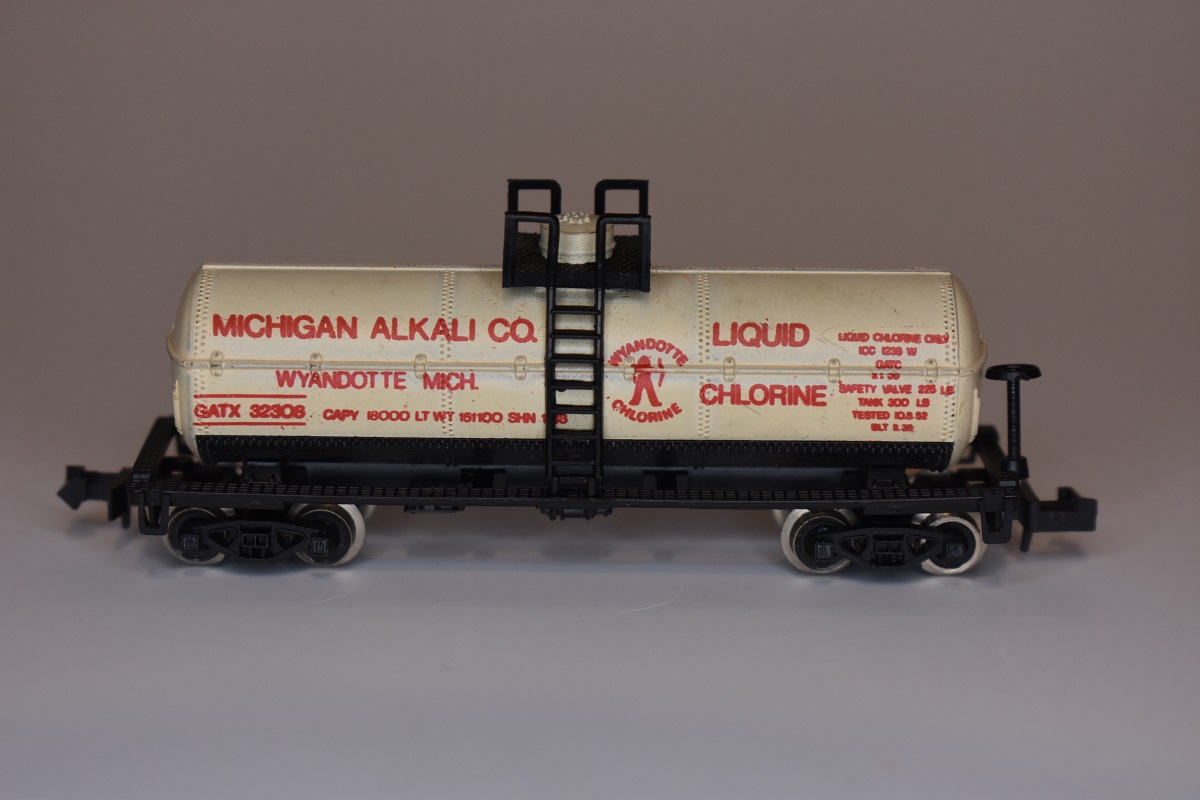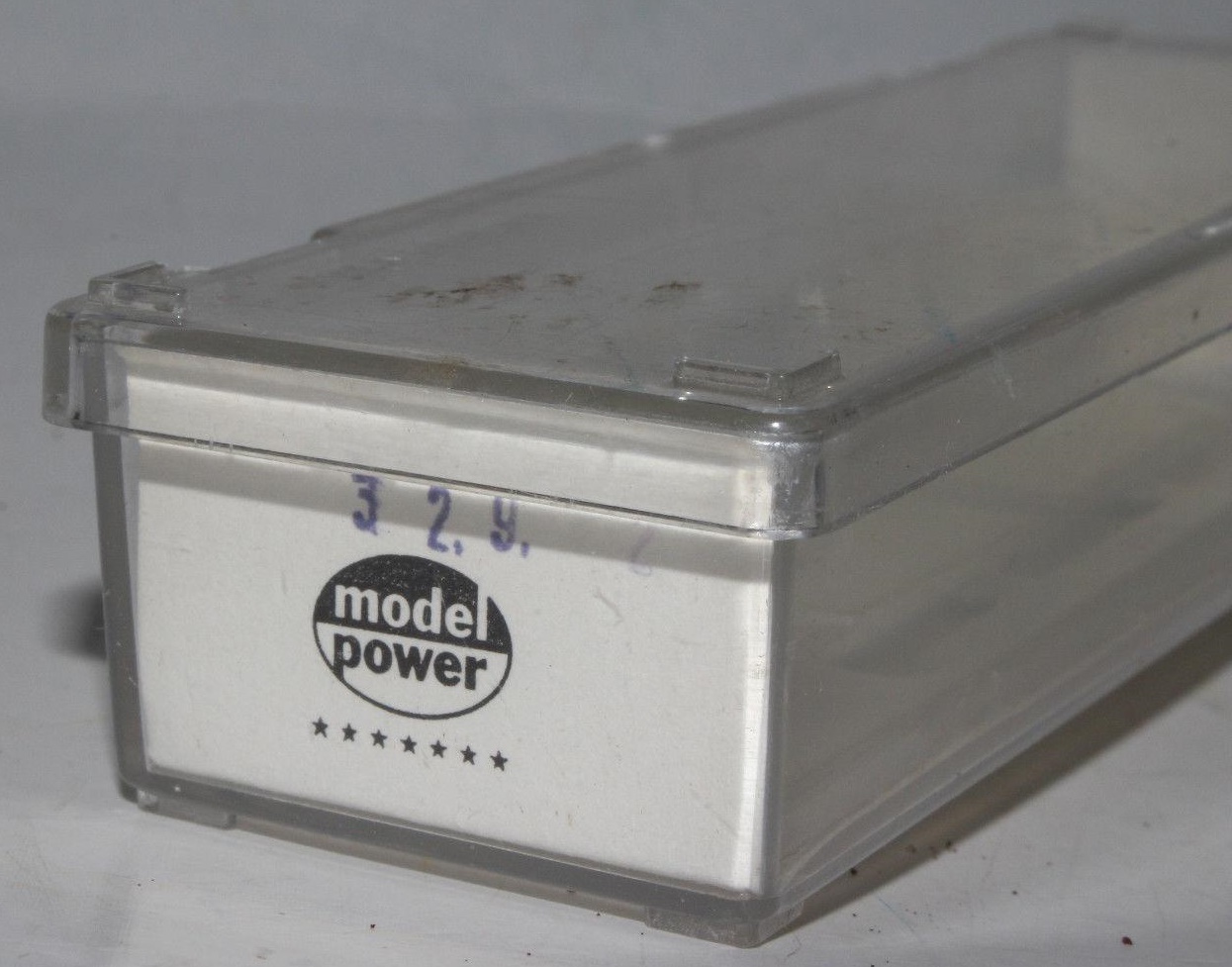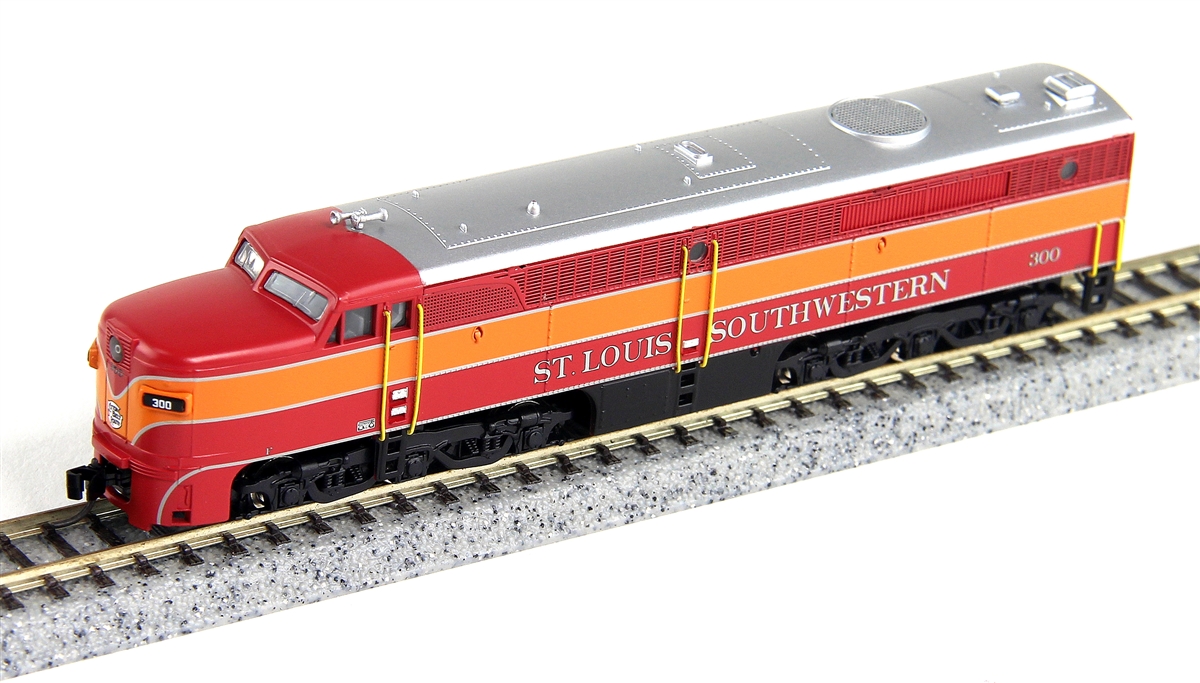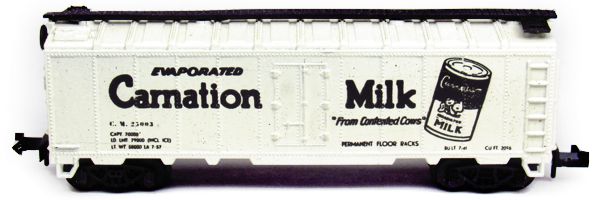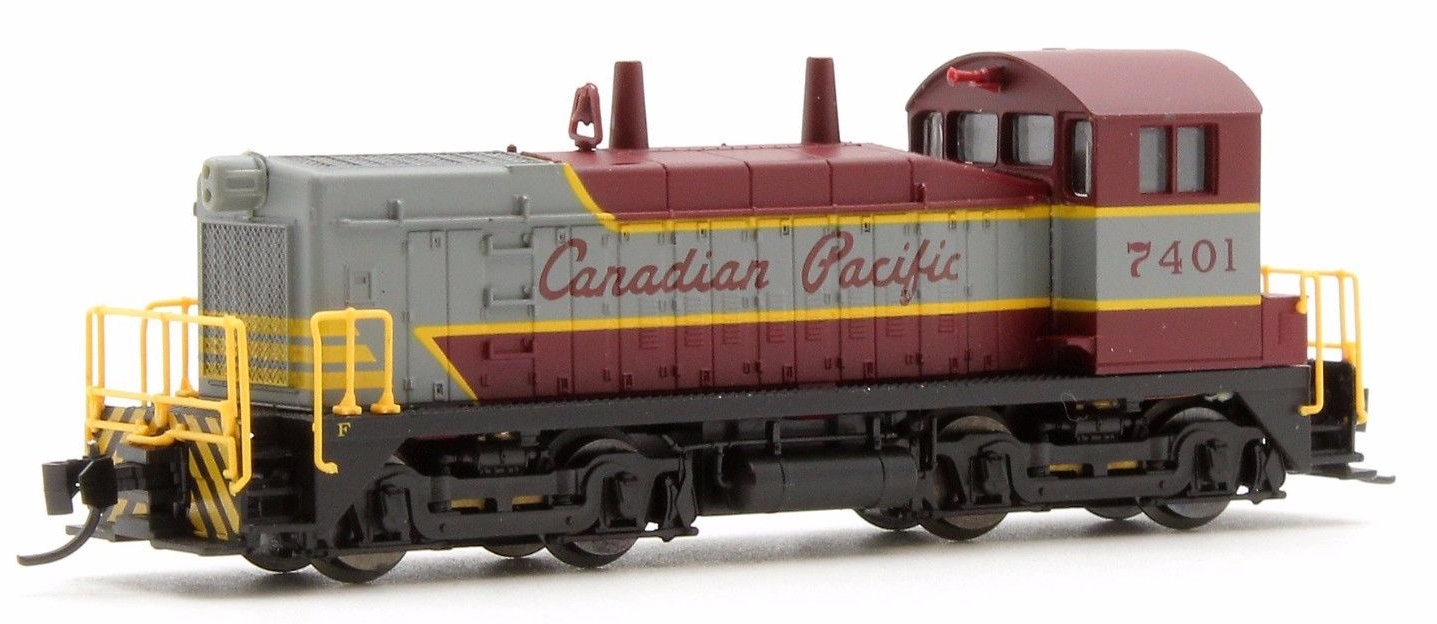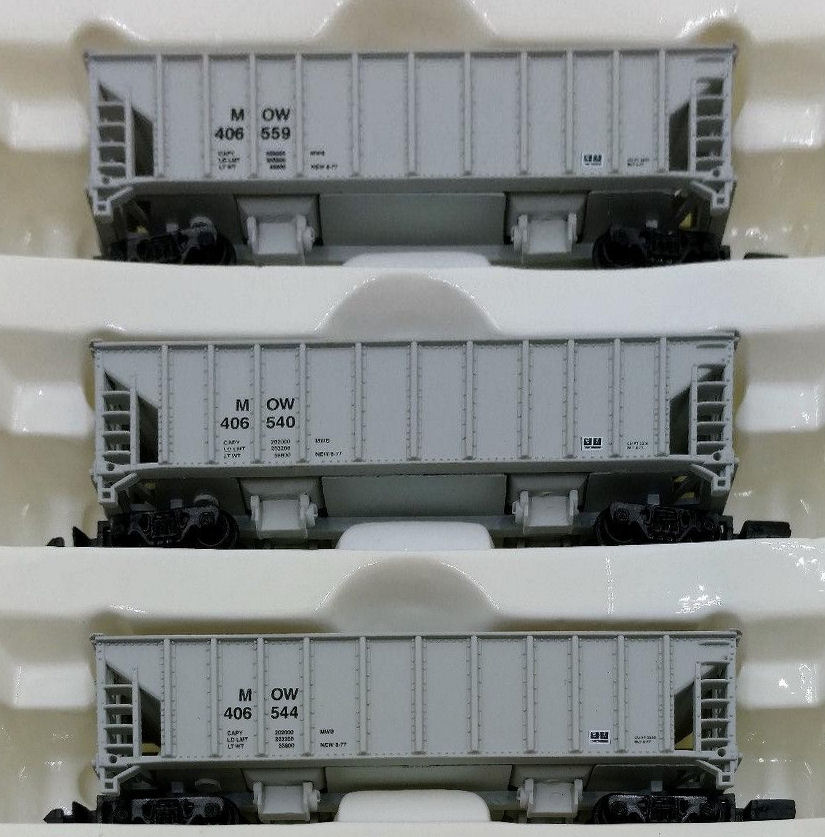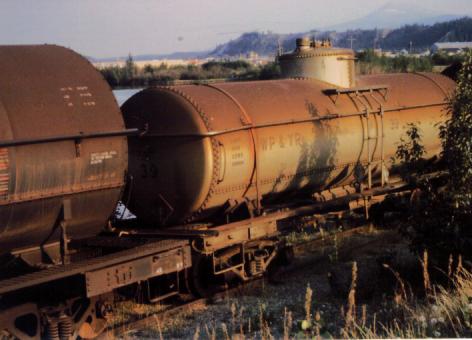Specific Item Information: Stock number same as Minitrix.
Model Information: This body style dates to the 1970s. It is a variant of the tank car made for import by Life-Like. It is different than their other model in that the dome is higher.
Prototype History: Single Dome tank cars are a railroad staple. They have been around since the first half of the 20th century. This length car can handle about 10,000 gallons. These railcars carry a wide array of commodities, including liquid fertilizers, chemicals, fuel oils and asphalt, and food-grade oils. Tank cars can be pressurized or non-pressurized, insulated or non-insulated. Single dome cars carry only a single commodity at once. Food-service tank cars may be lined with stainless steel, glass, or plastic. Tank cars carrying dangerous goods are generally made of different types of steel, depending on the intended cargo and operating pressure. They may also be lined with rubber or coated with specialized coatings for tank protection or product purity purpose. The tank heads are also stronger to prevent ruptures during accidents.
One common version is the ACF Type 27 jacketed tank car with expansion dome which was in common use by many railroads and oil companies.
One common version is the ACF Type 27 jacketed tank car with expansion dome which was in common use by many railroads and oil companies.
Road Name History: 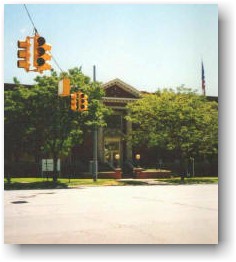 On October 17, 1890, Captain John Baptiste Ford (1811-1903) purchased this property along the Detroit River. He established the Michigan Alkali Company here in 1893. Ford had financial interests in several glass companies, and he chose the site for its proximity to resources needed to produce soda ash, a primary ingredient in the manufacture of glass. The deep strata of pure salt beneath the site was most important. Water from the Detroit River was used to extract the salt in solution form. The salt was used with limestone to produce a variety of sodium-based industrial and consumer products. The limestone was shipped from company owned quarries near Alpena. In the early years, Michigan Alkali's products included soda ash, baking soda and lye.
On October 17, 1890, Captain John Baptiste Ford (1811-1903) purchased this property along the Detroit River. He established the Michigan Alkali Company here in 1893. Ford had financial interests in several glass companies, and he chose the site for its proximity to resources needed to produce soda ash, a primary ingredient in the manufacture of glass. The deep strata of pure salt beneath the site was most important. Water from the Detroit River was used to extract the salt in solution form. The salt was used with limestone to produce a variety of sodium-based industrial and consumer products. The limestone was shipped from company owned quarries near Alpena. In the early years, Michigan Alkali's products included soda ash, baking soda and lye.
Since incorporating as the Michigan Alkali Company in 1893, these chemical works have played an integral role in the development of Wyandotte. The founder of the company, John Baptiste Ford (1811 - 1903), believed in corporate benevolance and generous donations were made to the city. The corporation continued this practice after Ford's death. One contribution was the first Wyandotte General Hospital, erected in 1926. In 1943, Michigan Alkali consolidated with the J.B. Ford Company Glassworks to become the Wyandotte Chemical Corporation. In 1969 it became part of the BASF Group of companies, headquartered in Germany. BASF continues to use this Georgian Revival administration building, designed by the Detroit firm of Chittenden and Kotting and completed in 1907.

Since incorporating as the Michigan Alkali Company in 1893, these chemical works have played an integral role in the development of Wyandotte. The founder of the company, John Baptiste Ford (1811 - 1903), believed in corporate benevolance and generous donations were made to the city. The corporation continued this practice after Ford's death. One contribution was the first Wyandotte General Hospital, erected in 1926. In 1943, Michigan Alkali consolidated with the J.B. Ford Company Glassworks to become the Wyandotte Chemical Corporation. In 1969 it became part of the BASF Group of companies, headquartered in Germany. BASF continues to use this Georgian Revival administration building, designed by the Detroit firm of Chittenden and Kotting and completed in 1907.
Brand/Importer Information: Founded in the late 1960's by Michael Tager, the 3rd generation business specializes in quality hobby products serving the toy and hobby markets worldwide. During its 50 years of operation, Model Power has developed a full line of model railroading products, die-cast metal aircraft, and die-cast metal cars and trucks.
In early 2014, Model Power ceased its business operations. Its extensive portfolio of intellectual property and physical assets are now exclusively produced, marketed, sold, and distributed by MRC (Model Power, MetalTrain and Mantua) and by Daron (Postage Stamp Airplanes and Airliner Collection).
In early 2014, Model Power ceased its business operations. Its extensive portfolio of intellectual property and physical assets are now exclusively produced, marketed, sold, and distributed by MRC (Model Power, MetalTrain and Mantua) and by Daron (Postage Stamp Airplanes and Airliner Collection).
Manufacturer Information: Mehano is a Slovenian toy manufacturer located in Izola, Slovenija. The company was founded as Mehanotehnika and was producing toys starting in June 1953. They first exhibited at the Nuerenberg Toy Fair in 1959. Mehano produced a number of different locomotives and rolling stock models for the North American market in the 1960s and 1970s. Companies such as Atlas and Life-Like imported a huge variety of their products. Generally they can easily be recognized as they are stamped "Yugosolavia" on the underframe. The company was formally renamed "Mehano" in 1990. Izola today is part of the country of Slovenia since the breakup of Yugoslavia.
Mehano filed for bankruptcy in 2008, but still continued to exist and operate. Since 2012, Mehano products are distributed by Lemke.
Mehano filed for bankruptcy in 2008, but still continued to exist and operate. Since 2012, Mehano products are distributed by Lemke.
Item created by: Alain LM on 2023-05-18 10:44:12. Last edited by Alain LM on 2023-05-19 04:27:24
If you see errors or missing data in this entry, please feel free to log in and edit it. Anyone with a Gmail account can log in instantly.
If you see errors or missing data in this entry, please feel free to log in and edit it. Anyone with a Gmail account can log in instantly.


